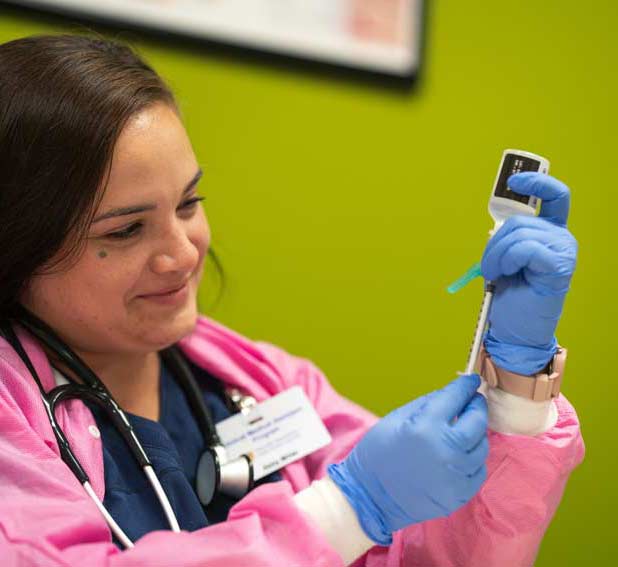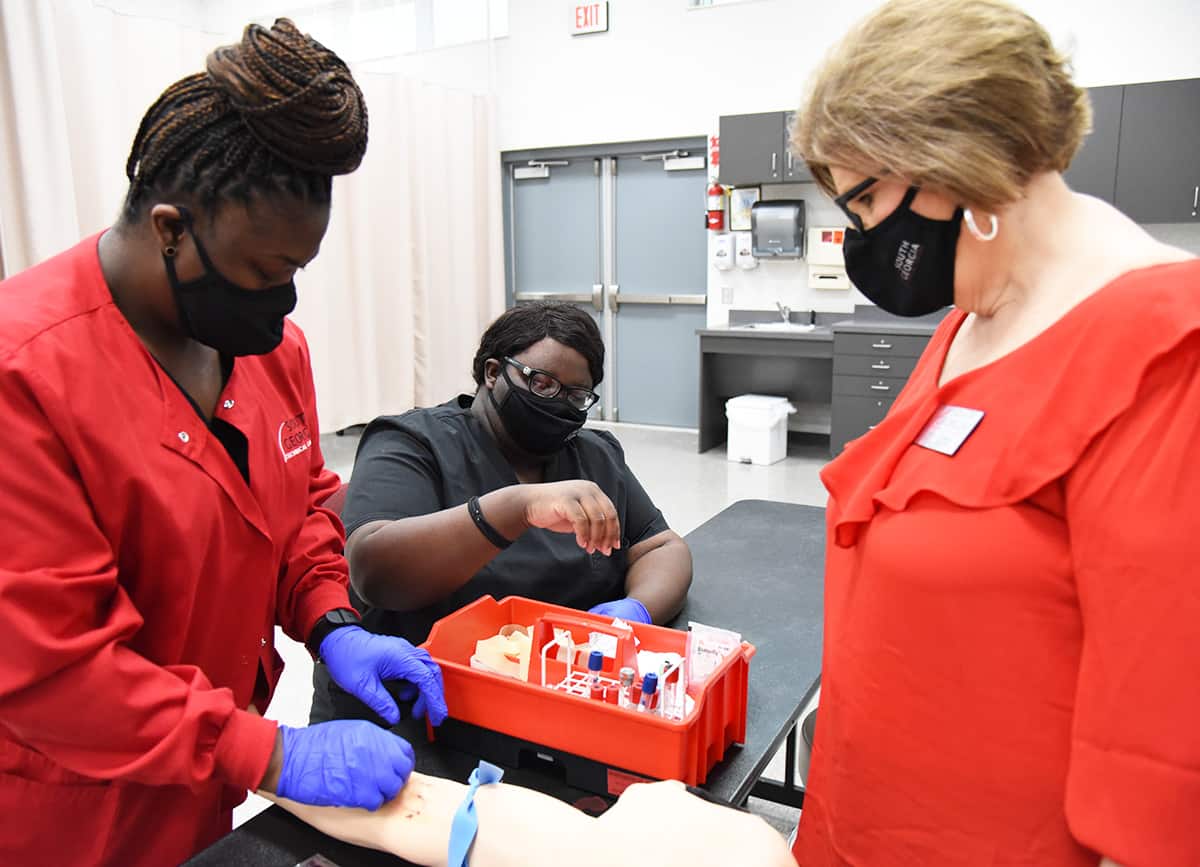Phlebotomy Classes Near Me: Career Impact Breakdown
Wiki Article
The Path to Qualification: Comprehending the Phlebotomy Training Course Trip and Its Significance
As you consider the path to qualification in phlebotomy, it's important to recognize the function you'll play in healthcare. Your training will cover vital abilities, from blood collection methods to patient communication.
The Function of Phlebotomists in Health Care
Phlebotomists play a crucial role in the healthcare system, functioning as the crucial link between people and important analysis screening. You'll execute blood draws, making certain examples are gathered precisely and securely. Your knowledge assists in detecting medical conditions, monitoring health, and directing treatment choices.In your everyday communications, you'll need to establish depend on with people, making them really feel comfortable throughout what may be a demanding experience. You are accountable for classifying and managing examples carefully to avoid contamination or errors, which could influence test results.
Yet, you'll typically work along with medical professionals and nurses, interacting vital info concerning individuals' problems. Your function is basic in maintaining the operations in healthcare setups, guaranteeing prompt and exact results. By grasping your abilities, you add meaningfully to person treatment, making you an essential part of the medical team. Welcoming this obligation is crucial to your success as a phlebotomist.
Overview of Phlebotomy Training Programs
When checking out phlebotomy training programs, you'll find numerous kinds created to fit various routines and learning designs. Each program aids you create essential skills like blood collection and individual interaction. Understanding these choices is key to choosing the right path for your occupation.Kinds of Educating Programs
Several sorts of training programs are readily available for those looking to come to be competent in phlebotomy. You can choose from certification programs, which generally last a few months and concentrate on essential skills. There are also diploma programs that supply an even more complete education, typically lasting up to a year. If you're trying to find a much deeper understanding, an associate degree in a related area could be the ideal fit. On-line programs provide flexibility for those stabilizing job or family commitments, permitting you to examine at your own rate. In addition, some hospitals and clinics supply on-the-job training programs, supplying useful experience while you find out. Whatever course you pick, each program intends to furnish you with the necessary skills for a successful phlebotomy occupation.
Secret Abilities Established
Mastering phlebotomy calls for a collection of essential skills that are created through complete training programs. Furthermore, communication abilities are basic; you'll need to engage with individuals, clarify procedures, and placed them at simplicity. Each of these skills is crucial for your success as a certified phlebotomist, making you an important possession in any medical care setting.Trick Parts of a Phlebotomy Training Course
In a phlebotomy course, you'll concentrate on crucial topics that lay the groundwork for your future profession. You'll take part in hands-on training that allows you to use what you have actually learned in real-world settings. Both the curriculum and practical experience are vital for your success as a phlebotomist.Curriculum Overview
While pursuing a phlebotomy training course, you'll experience a core curriculum developed to outfit you with fundamental abilities and knowledge. Phlebotomy Courses Near Me. This curriculum normally includes anatomy and physiology, focusing on the circulatory system and recognizing blood parts. You'll likewise discover different kinds of blood collection methods, including venipuncture and capillary slit methodsIn addition, infection control and safety methods are important parts, ensuring you understand how to maintain a sterile setting. You'll examine patient interaction, highlighting interaction and empathy, which are vital for reducing patient stress and anxiety.
Hands-On Training Experience
Obtaining hands-on experience is a crucial component of your phlebotomy training course. This functional training allows you to use what you've discovered in a real-world setup, improving your skills and self-confidence. Phlebotomy Courses Near Me.In addition, you'll get the possibility to interact with individuals, which is vital for establishing your communication skills. This mix of technological proficiency and interpersonal skills is vital for your success as a licensed phlebotomist. Eventually, hands-on training is where concept meets technique, solidifying your understanding and preparedness for accreditation.
Accreditation and Licensing Demands
Before you can start your job in phlebotomy, it is essential to recognize the certification and licensing requirements that vary by state. Most states require phlebotomists to hold a certification from a recognized company, such as the National Phlebotomy Association or the American Culture for Clinical Pathology. These qualifications normally include passing a test that examines your understanding and abilities in the field.In enhancement to certification, some states have particular licensing needs. You might need to finish a particular variety of hours in scientific method, submit proof of training, or go through a background check. It is very important to investigate your state's laws to make sure you satisfy all essential requirements.
Remaining notified concerning these needs not only aids you secure a placement but additionally enhances your reputation as an expert. By satisfying these requirements, you'll be well on your method to a successful occupation in phlebotomy.
Hands-On Training and Practical Experience
Hands-on training and sensible experience are vital elements of your phlebotomy education and learning, as they enable you to use theoretical understanding in real-world scenarios. During your training, you'll take part in monitored venipuncture, discover correct methods, and come to be familiar with different blood collection devices. This direct participation is crucial for developing your self-confidence and sharpening your skills.You'll function very closely with experienced specialists that can assist you via the subtleties of person communication and sample handling. Each practice not just reinforces Phlebotomy Training Course your understanding however additionally prepares you for the fast-paced atmosphere of medical care settings.
Additionally, numerous programs include professional rotations, enabling you to experience varied settings, from hospitals to outpatient centers. This exposure helps you adjust to different challenges and client demands, guaranteeing you're well-prepared for your future duty. Accept these possibilities, as they're necessary to becoming a skilled and compassionate phlebotomist.
Difficulties Faced Throughout Training
While obtaining hands-on experience is important, it's vital to recognize the difficulties that can develop throughout your phlebotomy training. Additionally, grasping the abilities needed for blood attracts takes technique; you may struggle with method at first.Time management can also be a hurdle, as balancing concept, useful sessions, and personal commitments can feel challenging. You may deal with varying finding out paces amongst your peers, bring about sensations of insecurity if you think you're falling back. Adapting to the different individualities of trainers can be difficult, as each might have a distinct mentor style.
Identifying these challenges early on can prepare you for success and aid you create durability throughout your training trip.
Profession Opportunities After Accreditation

As you obtain experience, you may even consider specializing in areas like pediatric or senior citizen phlebotomy, providing to specific individual needs. Some phlebotomists choose to progress their careers by becoming laboratory service technicians or going after further education and learning in medical care areas.
Furthermore, your certification can result in duties in training or managing new phlebotomists, enabling you to share your understanding. With the medical care industry constantly growing, your abilities will constantly be in need, paving the way for a secure and satisfying occupation. Embrace the chances waiting on you!
Regularly Asked Concerns
What Is the Normal Period of a Phlebotomy Educating Training Course?
Phlebotomy training courses commonly last around 4 to 8 weeks. You'll take part in hands-on method, classroom direction, and on the internet learning. Completing this training prepares you for qualification and a gratifying occupation in health care.Are Online Phlebotomy Courses Available?
Yes, on-line phlebotomy programs are readily available. They offer flexibility and ease, allowing you to study at your very own speed. Just validate the program is certified to meet qualification requirements and obtain beneficial skills for your job.Just How Much Does Phlebotomy Training Generally Price?
Phlebotomy training normally sets you back between $700 and $2,500, relying on the program and place. You must consider aspects like course length, consisted of products, and hands-on experience when selecting the appropriate training for you.What Are Usual Prerequisites for Phlebotomy Training?
Typical prerequisites for phlebotomy training typically consist of a senior high school diploma or GED, immunizations, and a background check. Some programs may additionally call for basic healthcare expertise or accreditations, ensuring you're prepared for hands-on training.Can I Work While Completing My Phlebotomy Training?
Yes, you can function while completing your phlebotomy training. Several pupils balance work with their researches, but make certain to manage your time effectively to ensure you meet both job and training commitments efficiently.Report this wiki page